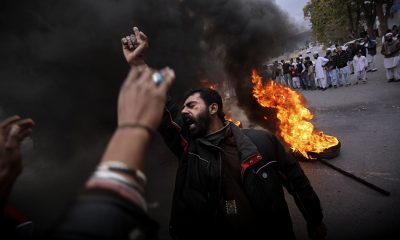By
Shakeel Haider
Religious extremists are only afraid of Education as their prime targets are educational institutions, students and sources of knowledge. In Pakistan alone, 800 schools were destroyed in the Khyber Pakhtunkha (KPK) province in the last five years by the Taliban and their accomplices.
The area of Swat which is included in the Malakand division, was the biggest hit as 640 schools were destroyed of which mainly female institutions were targeted. Thousands of students were in this way deprived of education. The majority of destroyed educational institutions could not be restored and religious zealots are therefore successful in keeping children away from education.
Here arises a question as to what is the main reason behind these sabotaging activities in which schools, and particularly female schools, were destroyed by the so called Faithfulls! The apparent reason described by many researchers and thinkers is that “Militants think the modern education system is the major cause of moral devaluation and irreligious tendencies. So destruction of modern education institutions is a nice way to keep people away from this menace.
The militant Taliban targeted Malala Yusufzai in 2014, as she was and is a vocalist of female education in Swat, Pakistan and now around the world. The other factor is the presence of multiple systems of education in Pakistan as Religious educational institutions called Madrasas, Urdu Medium schools and then English medium schools. There isn’t any harmony or point of convergence in all three systems, so different institutions creating different hybrid yield right from Peon to the top slot jobs. The sorrowful fact is that religious seminaries have been authenticated as factories of militancy and extremism since the Russo-Afghan war and participation of Pakistan actively in that.
Pakistan is a clear example of education crisis where an estimated 24 million children are out of school and a quarter of its total population is aged under 16. Even though it’s obligatory through Article 25-A of the constitution of Pakistan on the state to provide free and compulsory education to children aged 5 -16 years. But the figures regarding literacy in Pakistan are already not encouraging as 58% of all Pakistani adults are illiterate, the annual report by the “Conflict monitoring centre” reveals that the female illiteracy rate stands at around 75%. Almost three quarters of the total young female population isn’t enrolled in schools at all. Along with the destruction of schools in KPK and especially in Malakand division, another horrible fact in the report is the brutal deaths of hundreds of innocent children from 2009 onwards in armed conflicts across Pakistan, the majority of that in KPK and FATA.
The impacts of the Russia-Afghan war on the former NWFP or current KPK province are predominant on the demography as well as socio economic conditions of the province. As Pakistan joined this proxy war on behest of US and Saudi Arabia in 1979, a mushroom growth of religious seminaries appeared in a limited time span. Thousands of unregistered madrasas still work throughout the province, but specifically in FATA and mainly in Pashto speaking areas. There isn’t any hurdle to accept the literacy figures of the Abbottabad and Haripur district (88% and 65% respectively) where the literacy rate is higher than other districts of KPK. No wonder both of these districts of KPK have a very low number of terrorist incidents including school destruction, except the two incidents of bus killings in the Shia community in neighboring Kohistan and Mansehra districts in 2012.
The war on terror has placed drastic impacts on the province of KPK as the sabotage and terrorist activities literally were centered in bordering areas of Pakistan along Afghanistan and then in KPK and all over the country. Obviously, the vengeful war initiated by the Taliban ruined the balance and harmony of society with the uncertainty of law and order. This resulted in low development and progress in the area. The resources set for annual development plans had to be diverted towards security initiatives and a mechanism to save the citizens. That’s why most of the devastated schools have yet to start their classes again. Although efforts were done to minimize the loss of education, there still is much do. No doubt the provincial and local administrations have to do a lot to minimize the educational loss of affected children.
There isn’t any particular study done on the psychological impacts on children of terrorism affected areas, especially where schools have been demolished or partially destroyed. The scenes of destruction give enormous stress and pain to the sensitive minds, especially children. Although governmental institutions and departments try to ascertain fiscal costs and losses in the wake of terrorist and sabotage activities, psychological and mental losses and strains are seldom measured just because of a laxity and insensitiveness from the gravity of the situation.
The present provincial government in KPK announced an educational emergency in the province with a mere increase in the educational budget from 12.18 billion to 13.82 billion in its first year of rule. More ironic are the recommendations of the working group of the education sector in which jargons of curriculum change, provisions of text books and more stress upon teacher presence are being articulated as valuable solution and action plan.
The Luke warm response towards combating terrorism is evident that no major educational reinvigoration happened since 2013. Nobody in the government dares talk or takes responsibility of the loss occurred to the educational infrastructure and the mental stress shifted towards children, teachers and parents. Recently, bloody attacks on the Army Public School at Peshawar and Bacha Khan University in Charsada (KPK) by the Taliban have exposed the failure of provincial governments in providing security to educational institutions. More shameful are the decisions to allow teachers and students to keep their own weapons to fight terrorists. Hence, the State is just an audience watching a bloody game of terrorists. A public university in the same province was closed for 24 days just because the provincial government wasn’t able to protect it.
One has to rely on the quote of Aldous Huxley “that men do not learn very much from the lessons of history is the most important of all the lessons of history.” In the West, education is such a priority for the state and society that simply a school bus on the road is considered more important than the car of a high official on the road.
But with us in Pakistan and in KPK, the destruction of schools was never an issue of life and death. If Extremists know that Education is the prime target which affects the whole of society, why do successive governments not know this either?



Sir, beautiful, well done. you treated this issue very well.